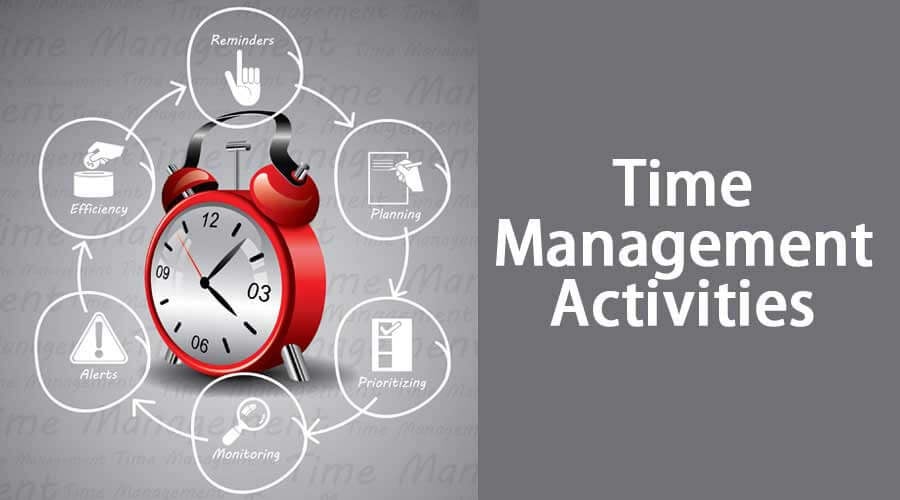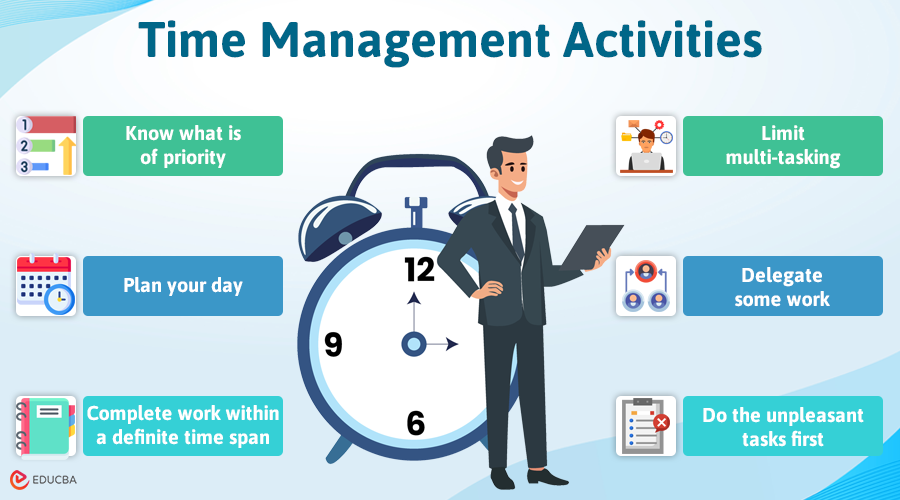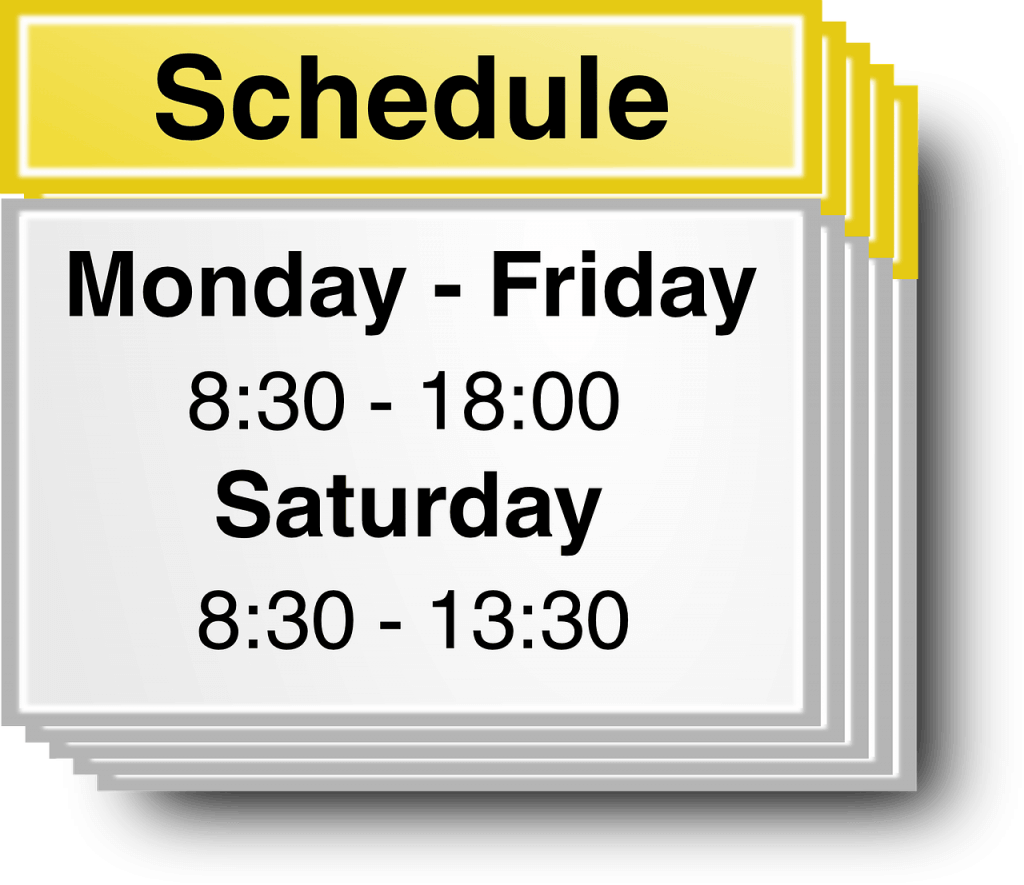Introduction to Time Management Activities
“Either you run the day or the day runs you,” goes a saying. This is true of most of us who have a volatile relationship with time. Often we feel that twenty-four hours are not enough in a day. “So much to do and so little time”, goes our pet complaint. Most of us struggle to fit in our work within the time limits specified to us and end up complaining that we are still running short of time even after trying our utmost. Managing time effectively is a skill that needs to be acquired with careful and continuous practice. The secret of the professional success of most people lies in the fact that they have learned effective time management activities.
10 Awesome Productivity and Time Management Activities
What comes to your mind when you hear of time management activities? Let me guess. Do you think either one of the following:
- I know all about time management activities. No one needs to tell me how to use my time better.
- Oh, I am hopeless at managing my time. Nothing can help me do better.
If you have ticked a), then let me tell you that the best managers often fall into time traps that lower productivity and eat away at their packed schedules. For example, an urgent mail comes in, and you rush to answer it. Your work-in-progress remains just that… in progress. Or an urgent summons comes in from the boss, and you leave everything to attend to it. Or some coworkers start discussing some juicy topic, and you are sucked into the conversation, and before you know it, it is time to submit your work, and you are way behind. So don’t you think you stand to gain from pointers on time management activities?
And if you are the sort that has ticked b), then there is hope for you yet. All is not lost. Time is a resource that always seems scanty for your type, though it is sometimes your fault. Either you are overburdened with work or are not organized well enough. Whatever it is, you can benefit from some well-timed tips on managing time effectively.
Time is a resource that is usually very much in demand and, consequently, very scarce. Most of us constantly run against time or try to quickly fill in as many things as possible. Paradoxically, some of us are trying to fill in time, as we have nothing much to do. For such people, without meaningful employment, the day seems to stretch on and on.
Whatever our relationship with this valuable resource is, it is never ideal. Have you ever met someone who said, “I am managing my time fine? Every moment is well utilized.”? My guess is no. Even the most successful CEOs and leaders have become flustered trying to manage their time efficiently.
Time is such an invaluable, much-in-demand resource because it is not responsible. Once gone, it is gone forever. No amount of effort or money will bring lost time back.
Proper time management activities help improve the overall quality of our life, besides giving us better job satisfaction and work performance. Our work life becomes more efficient, and we can enjoy leisure more if we manage our time. Let us see how we can use this resource optimally in the workplace to boost our productivity and satisfaction.
1. Not all work that comes to your table is equally important.
You need to know what is of priority. Ask yourself:
- What do I need to do?
- When do I do it?
- How well do I do it?
You must prioritize your work in order of importance and urgency. All papers or mail marked urgent need to be read only then and there, disrupting your workflow. Or you can be in danger of making someone else’s priority your own.
Prioritizing helps you focus on tackling the important things and then handle routine matters. If you have more than one important task pending, plan how you will finish these. Decide on the sequence of functions. Don’t allow disturbances or interruptions to throw you off track. Keep your schedule in front of you with a tasks-to-do list. Tick off items as and when they are finished. Time tracking software is also a good option for time management
2. Plan your day
Reach the office or your workplace before the specified time, a little ahead of others. Sit down calmly and plan your day. Digital organizers can help you in scheduling tasks and remind you of these. Keep aside time for meeting internal and external clients and time for interaction with colleagues and your team members. An employee time management system can further assist in organizing your tasks efficiently. Of course, your schedule will go differently than planned, so make allowances for minor variations.
3. Try to complete work within a definite time span
Time management activities help your work duties and stick to the time plans. Stay within your work day and carry work home. Try to complete things within the specified work hours. Group tasks that have an overlapping period. For example, if you meet a client, use the waiting time to fill in standard formats. Make ticket reservations online while paying your bills. Maintain the meeting’s attention on the agenda and write down the points discussed. People who see you sticking to time schedules tend to respect your time too.
4. Limit multi-tasking
Yes, multi-tasking looks very good on paper; it gives you more anxiety and heartburn than concentrating on a single task simultaneously. You think you are attending to ten things at once, but you are leaving all functions in different stages of completion. The market report needs to be completed, your customer is waiting, your coworker requests your response, and your boss wants the file you promised to finish work on. You started your career on all these but soon got overwhelmed and needed clarification. Finishing tasks one by one gives a sense of satisfaction and control.
5. Delegate some work
You need not to do everything yourself. Minor tasks can be delegated to junior staff. Ask the telephone operator to make cold calls for you. Get a peon to oversee the printing and photocopying work. Routine office work, like mailing, following up, etc., can be delegated to assistants. Use a timesheet app instead of filling the timesheet manually. Concentrate on the bigger and more significant tasks. Make sure the delegates report their progress to you, however. Else you will have a bigger problem repairing work that was incorrectly done.
6. Do the unpleasant tasks first
None of us want to do what we dislike, but work must be done. Spend some time in the morning planning how and when you will tackle the unpleasant tasks. If you have been avoiding meeting a cranky customer, schedule it for some time in the day and get it over with. That tedious report you have been assigned? Start work on it and get it off your mind. Unfinished work tends to occupy space in your mind. The more you procrastinate, the more cumbersome these tasks become and the more reluctant you feel about starting them. Do not put off these tasks. Tackle them one by one.
7. Don’t check your messages and e-mails through the day
Don’t check your e-mail now and then. Set aside time for checking these, and keep your notifications off for the rest of the day. Checking e-mails and replying to them wastes much of our working time, so do it only at the scheduled time and not during the remaining work hours. It distracts you, and before you know it, you will spend all day replying and responding to non-urgent mail and texts.
8. Set aside a block of time for paperwork and letters
Instead of reading things as and when they find their way into your in-tray, keep aside time, preferably in the afternoon, to do your reading. The period after lunchtime is a slack one; read your mail and letters at that time. Use this time to write memos or letters. Except for highly urgent mail that needs an immediate response, everything can wait till the afternoon. Write your correspondence when not pressed by other urgent work or phone calls.
9. Learn to say no
This is an important tactic all of us need to adopt. We should be able to say no to unreasonable demands on our time. Most people follow an ad hoc practice of making demands and requests to get jobs done. Remember that your time is precious, and people must respect it. Say no to people when they come to you with unplanned requests. When you are busy with an assignment, make it clear that you will not entertain any sudden changes in your schedule. The prime reason we always feel short of time is that we spend most of it doing work we had yet to plan or schedule earlier. Learn to refuse people politely.
10. Seek the help of supportive co-workers in the time management process
Ask a helpful colleague to help you stick to your work schedule. They can remind you when you go off track and help with some of your workloads when things get unbearable. The support of coworkers often inspires us to stick to our time management process plans.
You might also like to read Effective Time Tracking Apps.
Now that you know the steps to take for the time management process, take this quiz to see whether you can follow the pointers.
1. I am reaching my workplace 10 minutes before time.
Yes/Not yet
If your answer still needs to be, then buck up. You need that extra time to plan your day and gather your ideas. It is worth the effort, trust me.
2. How can employers ensure proper time management during employee onboarding, especially when relocating employees from one location to another?
To ensure proper time management during this process:
- Employers can establish a detailed onboarding plan that outlines employees’ responsibilities and the timeline for each task.
- Employers can outsource services to monitor progress and identify potential delays or issues. For example, if you are relocating your team to the UAE, services like Employer of Record Dubai can streamline the entire onboarding process on behalf of your business.
3. I do the most important tasks first.
Always/Sometimes
If you do not do the important work before it becomes urgent, soon you will be left gasping for breath with critical tasks all demanding your attention. And your boss wants the report, like yesterday!
4. My daily schedule helps me in planning and executing tasks.
Yes/Sometimes
Still, have you habitually written daily to-do tasks in a list? You will continue to work haphazardly and respond to demands as and when they come without a sense of priority.
5. I read my mail and texts as they come.
Yes/Sometimes/No
What did we discuss about repeated checking of messages and e-mails? Please do it in the afternoon or early morning before things start. And remember, no Whatsapp or Facebook during office hours, please.
6. There are some things that I put off doing till absolutely unavoidable.
Yes/No
So you still procrastinate and put off unpleasant work? Grow up and tackle the tough things first.
7. I refuse my colleagues occasionally when they request some work from me.
Yes/No
If you have learned to say no, excellent. If you still need to, be prepared to accommodate unwanted last-minute demands on your time.
8. I have eliminated unnecessary tasks or delegated these.
Yes/No
Still, doing your cold calling yourself? Delegate or be overburdened with repetitive and uncreative stuff while the important things keep waiting.
9. I finish one work at a time before proceeding to the next.
Sometimes/No
So you do twenty things simultaneously? Since you are a multi-tasker, how many tasks have you finished? Chances are none. Concentrate on doing one thing at a time.
Creating a profitable relationship with time takes time and constant practice. Time management requires an awareness of ourselves and our daily habits and the actions that lead to time wastage. We can detect and eliminate several time-wasting activities if we consciously review our lifestyle and habits.
So make time for your friend and ally. Establish a rewarding relationship with this resource and improve your work output and quality. It requires some self-discipline and control. Soon you will find yourself racing ahead with the help of time management activities in time and delivering better work than your counterparts. All the best!
Recommended Articles
This has been a guide to Proper time management activities help to improve the overall quality of our life, besides giving us better job satisfaction and work performance. These are the following external link related to time management activities.








